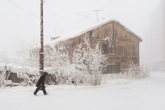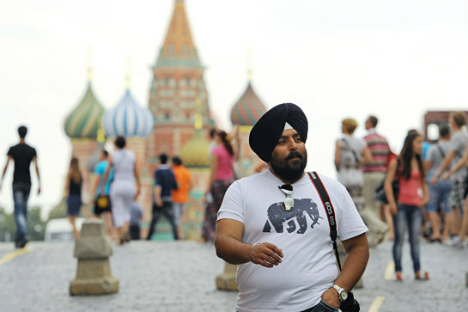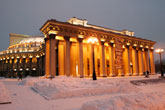Siberia: A land of spaces and mystery
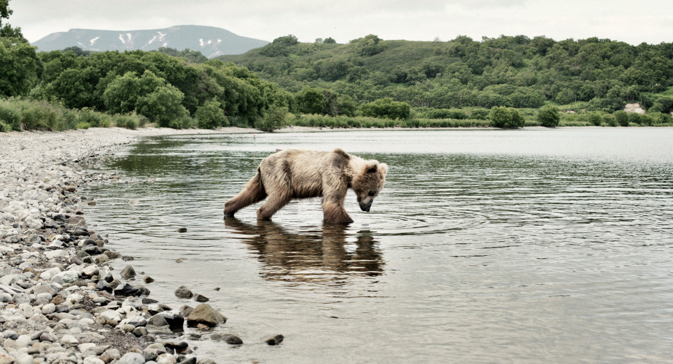
Siberia is a land breathing with legends and great deeds. Source: Yuri Kozyrev / Noor
Siberia is a snowy space, in which thousands of mountain rivers merge in the Yenisei’s Milky Way, the lakes’ constellation disappear into the dark abyss of endless taiga, full of unexplored galaxies, black holes and snow blizzards hidden from daylight. Baikal is the brightest star in the blackish sky, floods the Tunguska meteorite craters, and nebulae of the Arctic tundra with light, lighting the way for travelers to satellite towns frozen beyond time and space.
As you come back from Siberia, you cannot forget the fluffy fir paws, your eyes do not get tired of gazing at the endless green space and your ears can only hear the wind. Siberia is a state of the soul. It is a land of mines, convicts and real heroes. It is a land of bears, taiga is an eternal winter and spaces without horizon, breathing legends and great deeds. It is the main symbol of Russia, and at the same time, it is a big mystery, even for Russians.
"If you're not from around here you're not likely to go to Siberia of your own free will. Few people prefer it to southern resorts or modern metropolises. Some sparsely populated snowy spot that is distant and expensive to fly to and there is nothing to see. This is what is often said, which is very disappointing. Not knowing Siberia means not being familiar with Russia. After all, our country does not end in the Urals; this is where it originates,"- says Pavel Belogolovtsev, a young traveler.
In the past, Russian authorities have paid special attention to the development of domestic tourism in the country. Many grants were given for infrastructure development in the most "promising" regions, with tenders being announced for rebranding popular destinations; a clear action plan was developed leading to 2020.
However, even the Russians still confuse Siberian Krasnoyarsk with Black Sea Krasnodar and industrial Novokuznetsk with the port of Novorossiysk, although they are almost 5,000 kilometers apart. The Siberian cities of Tomsk and Omsk – all merge into one in the visitors’ understanding.
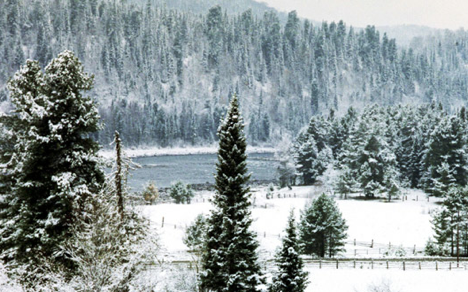
Siberia is a land of bears, taiga, eternal winter and spaces without horizon. Source: Yuri Kozyrev / Noor
"For many, Siberia is a place of exile, prison and bears. We are not arguing that in Krasnoyarsk, there are cases when the bears come to town and we really have six months of winter, but Siberia has long been living a new and interesting life. Our main goal is to show that Siberia is perfect for travelers" – says Anna Gruzdeva, co-author of "Siberia and Full Stop."
This year, journalists from Krasnoyarsk, Anna and Diana, received two grants totaling 60,000 rubles ($2,000) for the creation of a guide to Siberia, which in the future should be the basis for an interactive map. Journalists explore not so much the Siberian metropolises, but rather the small villages, nature reserves and lost monuments that risk being forever forgotten by the young generation of travelers and even the Siberians themselves.
Tiny "birthmarks" on the map of Siberia – Small Syya, Eniseisk, Listvyanka, Ergaki – each one of them is dedicated to a separate chapter, which describes in detail and tells about the locals with tenderness, unique traditions, culture and remarkable sights that are worth visiting, as well as about how to get there and where to stay. Even if these villages have no hotels or hostels, locals willingly leave their phone numbers in order to receive guests.
"We do not expect that tourists will flock to us. But we believe the understanding is that you, sitting in a cozy city café with a laptop, and a person who produces furs every day, are united at least by the territory. This shifts the usual picture of the world in a good way..." – as the journalist told the Moscow magazine The Village.

Siberia is a state of the soul. Source: Yuri Kozyrev / Noor
If the project "Siberia and full stop" is now directed to the Russian audience, the blog askural.com, created by the Yekaterinburg radio presenter Lubov Suslyakova, is functioning for foreigners, it talks about how, where and why the Urals are worth visiting. Over time, the blog has become so popular that Lubov has had to leave her profession and become a guide.
Both business travelers and ordinary travelers come to Yekaterinburg, the capital of the Urals. The latter usually get here by rail – Yekaterinburg is one of the main Trans-Siberian railway stations. Lubov shows the guests the places of the Ural capital that are rarely found in Russian guidebooks – plants of Nizhny Tagil, Uralmash the "Mafia cemetery" on Shirokaya River, the Deer Springs natural park or small villages in the region of Nevyansk where you can study traditional pottery.
"... Locals are used to complaining that it is dirty and shabby here with nothing to look at. Tourists opened my eyes; they convinced me that it is now good to be living in Russia,"- says Lubov.
Today, there are websites for foreigners created by locals in Yakutia, Novosibirsk, at lake Baikal, Altai, and in Moscow. In the wake of a new idea to rebrand the Russian cities, students and designers from the "Eksprompt" art-club together with Kerim Akizov founded the first in the Caucasus "Perimeter" art cluster, located in Nalchik – now there are open air movies shown here, exhibitions and galleries, concerts are organized as well as barbecues, which gather the entire city. According to Kerim Akizov, the project manager, the main idea of the "Perimeter" was to begin to "change the image of the Caucasus."
Until recently it seemed that the entire regional culture was only a copy of the projects designed by the capital’s bohemians, and youth only wants to go closer to Russia's western border. "Projects satellites," are not yet related to each other, they appear in the regions. Caucasus, Baikal, Siberia, and the Urals – possibly, their stars will shine brighter than the agglomeration of Moscow and St. Petersburg. Unlike conventional capitals, the new "education centers" arise primarily due to the energy and perseverance of the people who live in them, and that is why their "fire" will not go out, even if state funding for tourism development projects suddenly stops, stars will still shine in Siberia.
All rights reserved by Rossiyskaya Gazeta.
Subscribe
to our newsletter!
Get the week's best stories straight to your inbox
